AI is rapidly transforming digital advertising and search, as evidenced by Meta’s significant AI investments and the ongoing Google antitrust lawsuit, which could reshape industry competition. New AI-driven search models like ChatGPT search are also emerging, offering conversational queries and challenging traditional search engines. This evolving landscape presents both opportunities and challenges for businesses, necessitating a focus on quality content, strategic adaptation, and leveraging new AI tools to maintain relevance and drive effective campaigns.
An in-depth look at how these platforms work and a comparison between ChatGPT search and Perplexity AI.
AI-driven search models like ChatGPT search have the potential to create a seismic shift in how we search for information online. In part 1 of our AI and Search blog, we take a deep dive into a comparison of Open AI’s ChatGPT vs. Perplexity AI. Both models are designed to handle natural language queries, allowing users to search in a conversational style that traditional search engines aren’t built to handle. Yet their results sometimes differ greatly.
How ChatGPT Search Works
Before we delve into our comparison, let’s offer some background on ChatGPT search. Its approach to search marketing revolves around understanding natural language to provide meaningful responses. Here’s a breakdown of its process:
- Natural Language Queries: Users enter queries conversationally.
- AI Processing: ChatGPT search interprets the query, analyzing both intent and context to determine what the user is truly asking.
- AI Searches the Web: Partnered with search providers and supported by content from OpenAI’s partners, ChatGPT search scours the web for relevant content to match the intent of the query.
- Result Ranking: It ranks these results based on relevance and accuracy (which at the moment remains proprietary and opaque).
- Response Generation: Finally, ChatGPT search presents a summary response with inline citations, accessible via a “Sources” button that reveals the information sources.
These steps create a streamlined, conversational search experience. But while the answers provided are concise summarizations, we also wanted to know how these search results compared with other similar AI-based search platforms and if they are more helpful than using Google.
Comparing Perplexity AI and ChatGPT Search
We looked at three different types of searches for both engines: local/timely, informational, and transactional to get a sense of how these new search engines will be able to serve everyday answers, along with follow-up questions to engage its conversational abilities.
Localized and Timely Summary
For a localized search, both ChatGPT search and Perplexity struggled with their accuracy, delivering results that provided little to no convenience that we have all come to expect from search engines. We start with something common: “where is the nearest gas station?”
ChatGPT search served a map with gas stations in a different town, requiring the user to refine their search to the specific town they were searching from. Perplexity gave a less useful response that sounded more like a guide to finding gas stations and how to pick which location. This kind of information doesn’t fulfill the needs of someone looking for the closest gas station. For example, both results produced sources that contained either news about gas stations or the websites of the gas station brands.

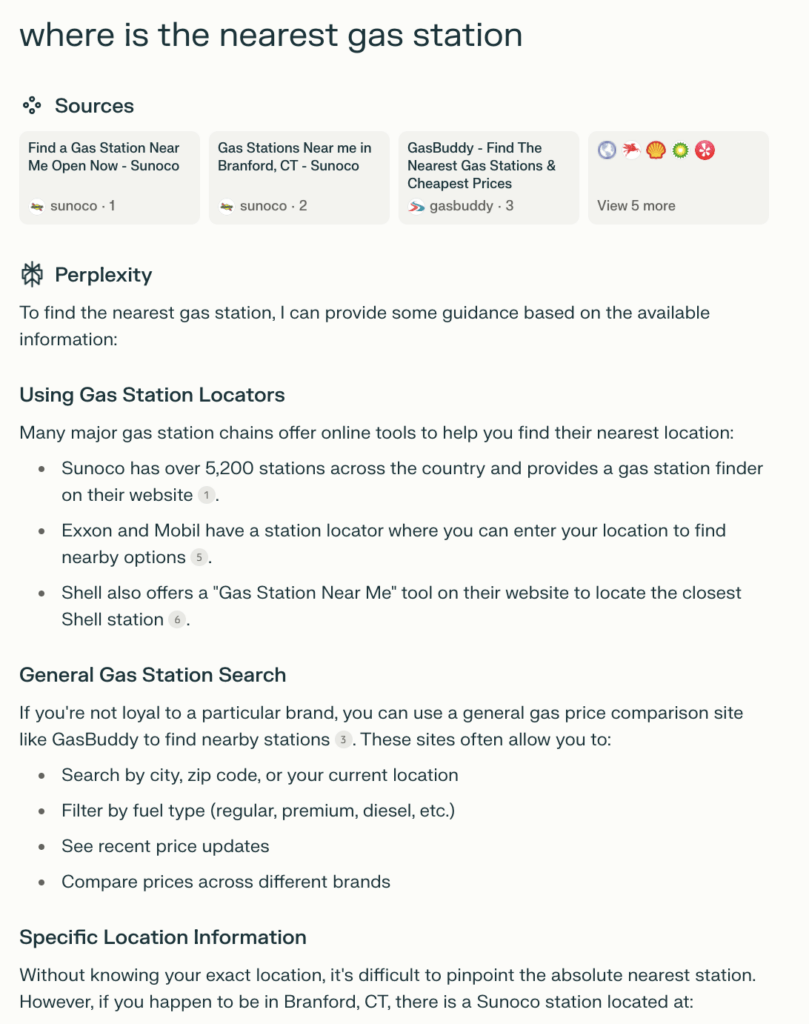
Localized Follow-up
We followed up with each platform with, “I work in Cheshire CT” to help show us gas stations near our office. ChatGPT search results showed a refined map search with gas stations in Cheshire, CT and Perplexity did the same and in the same format it originally gave us. For localized searches, both platforms have some work to do, but it seems like ChatGPT search is closer to a preferred result, mimicking what Google or other search engines provide.

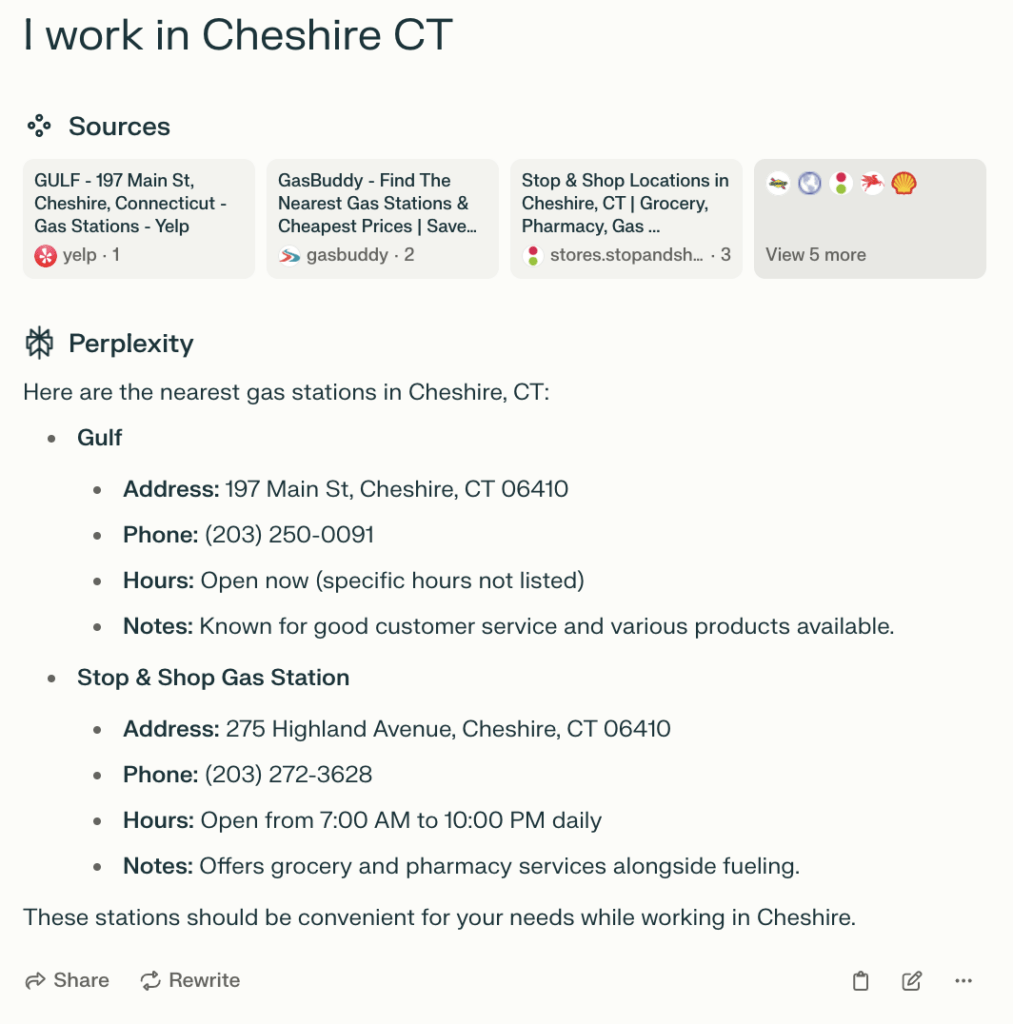
Informational
Against a search for “when to clean my gutters,” both AI search tools provided a description of how and when people should be planning to clean their gutters. ChatGPT’s response was more brief and also tried to localize the answer to a nearby town to give specific recommendations based on the local climate. Perplexity generated a much longer response with more detail about gutter cleaning.
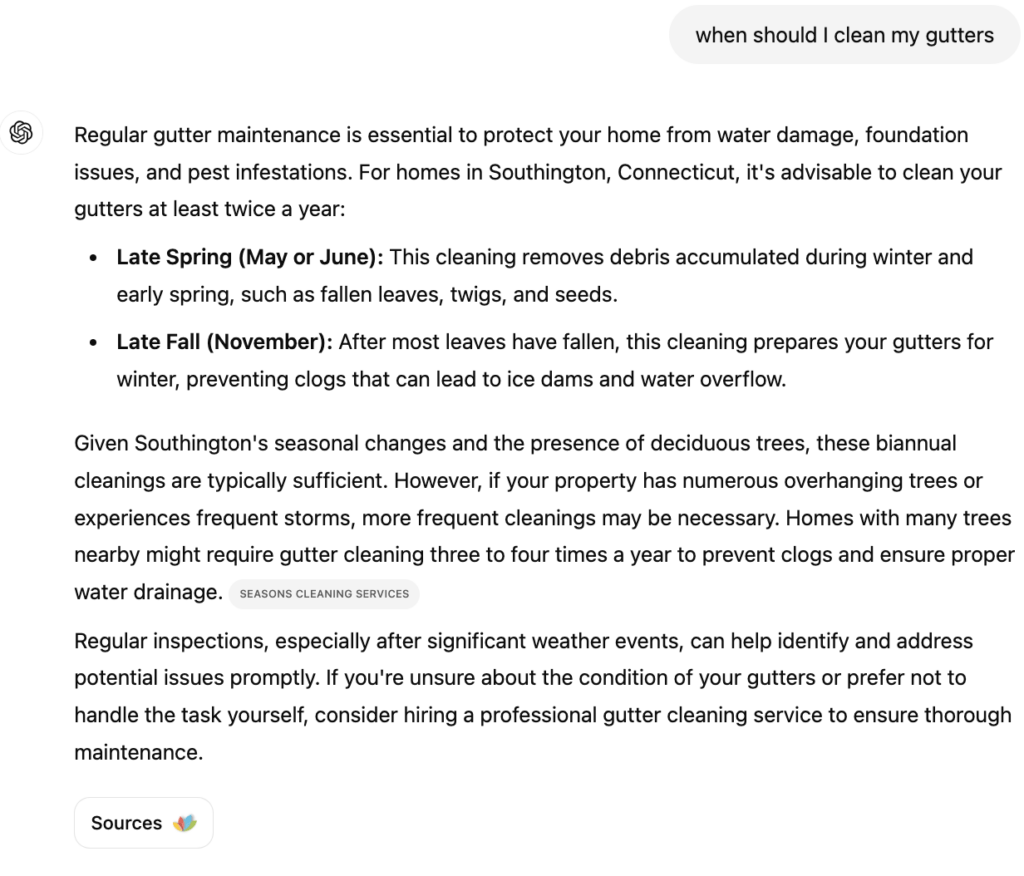

Informational Follow-up
When we followed up on this question with, “is there anything I need to do specifically in the fall?” we left out the term “gutters” in this query to test the platform’s ability to recall the current conversation. ChatGPT search generated a response that went broader and spoke about other ways to prepare a home for fall, whereas Perplexity kept the conversation going and offered information specific to cleaning your gutters in the fall.
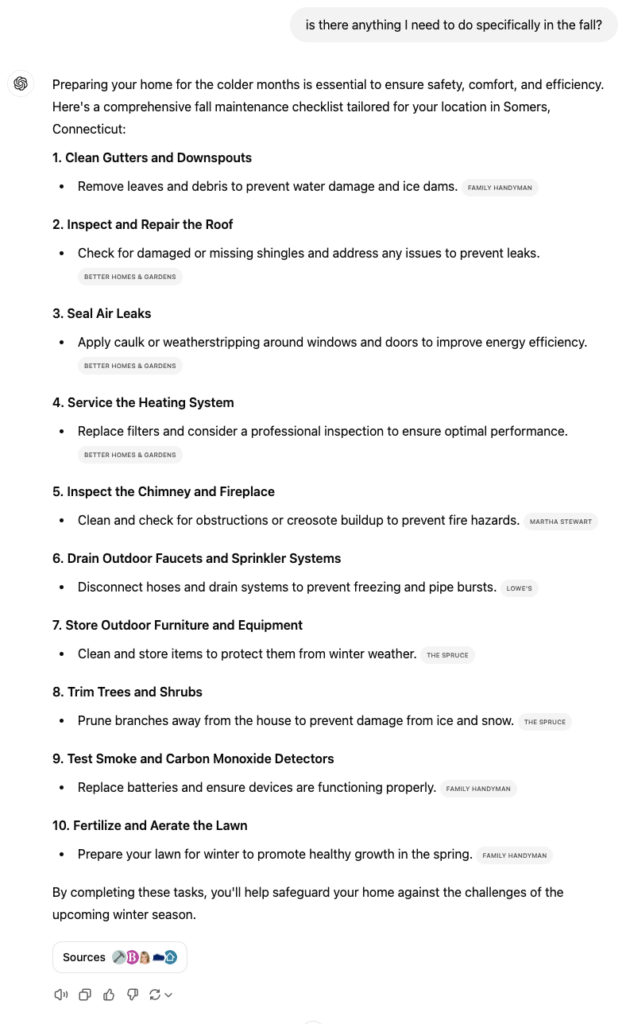

Transactional
For our final comparison we searched, “hiking boots for men” to help us start our shopping journey. At first glance, both of the results seemed very similar with a small description of the product at the top and then listings for relevant products below with an image of the boot.
Perplexity stands out, however, with more detailed product cards for each boot that include the price, a link to the website, and a small section called “Buy if…” with key features of the product that should be highlighted. ChatGPT search, on the other hand, only provides a product description with a source and an image. Between these two results, Perplexity is clearly more useful for shopping searches.
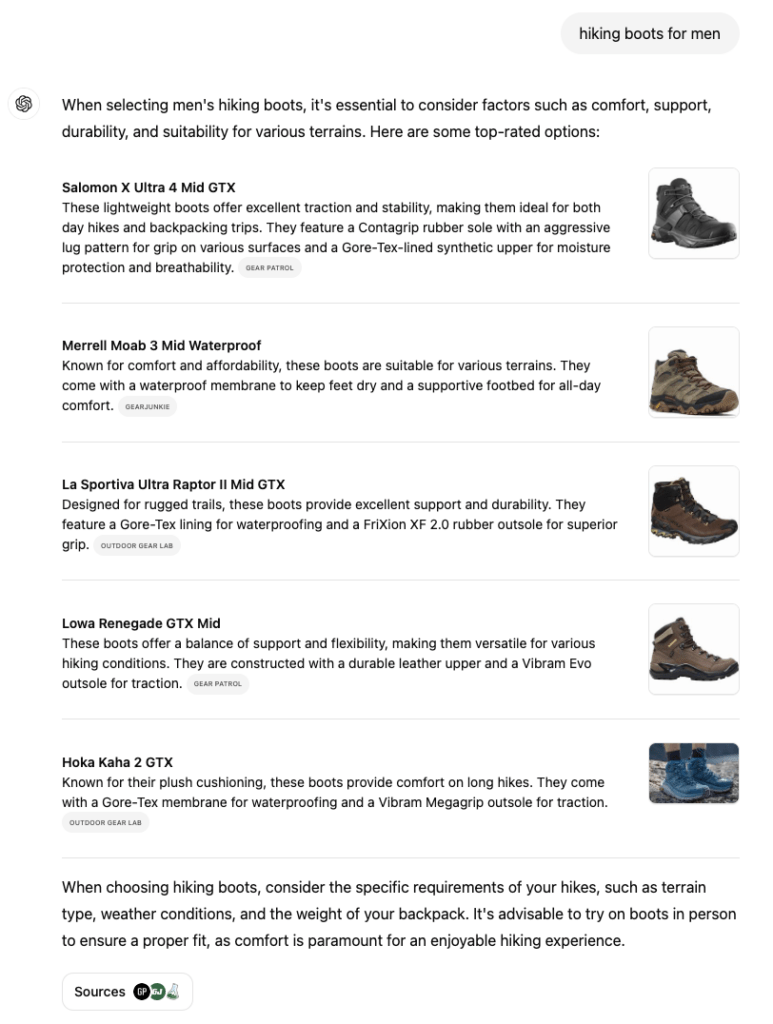
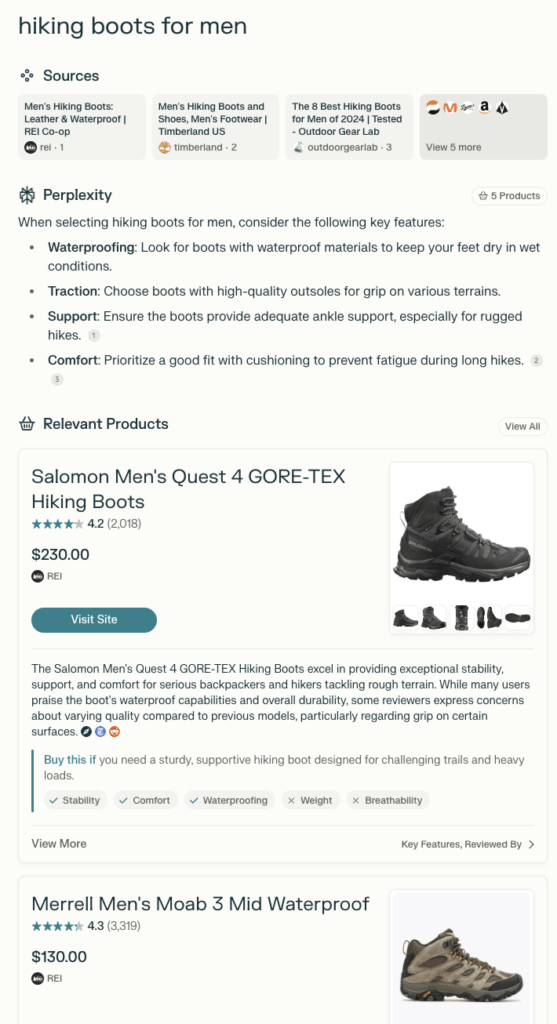
Transactional Follow-up
While these results showed us what kinds of boots are available we refined the results by asking, “show me the most affordable waterproof boots.” ChatGPT added pricing for their refined results when they didn’t from the original query. This result is also interesting because it only showed products from Amazon, whereas the original query had a diverse range of sources to purchase boots for men. Perplexity had a more diverse range of sellers in their results although the first boot had a 1-star rating from a single review. We did ask for the most affordable, not the best rated.
Most results included a “Visit Site” button to go to the website’s product page, but Northway Shoes and Repair’s listing had a “Buy with ShopPay” button, which stood out because it allows the user to purchase straight from Perplexity via ShopPay instead of going to the website.
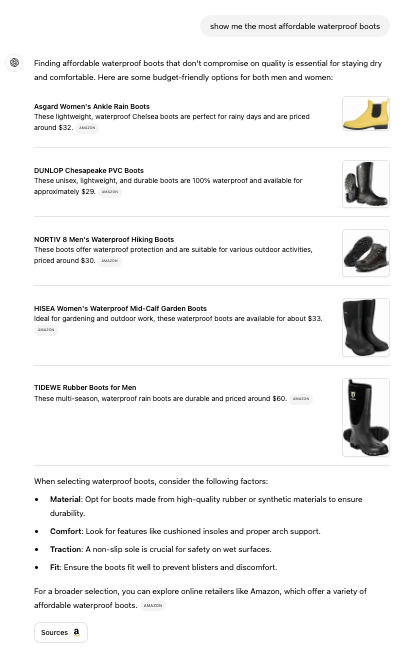
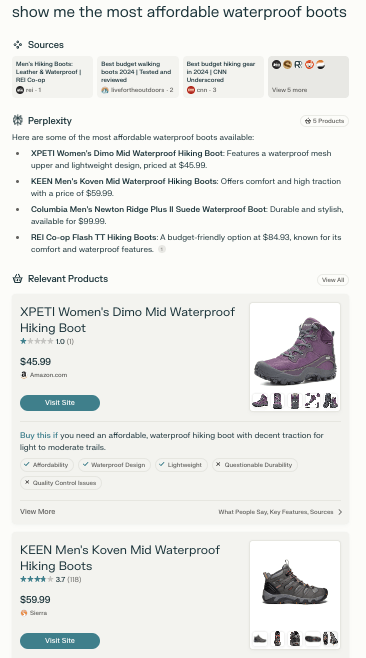
Benefits and Limitations of AI Search
The entry of ChatGPT into the search market promises several benefits but also has some limitations when compared to Google’s traditional search engine.
User Experience and Engagement
The ChatGPT search interface is clean and conversational, lacking ads and complex layouts. Users can focus solely on the information they need without distraction. This setup could improve user engagement since fewer distractions means more direct attention to the content. For marketers, this offers a chance to attract potential customers with concise, relevant answers, a key advantage in an attention-limited environment.
Local and Specific Searches
ChatGPT search still faces challenges with highly localized searches. Although it leverages third-party providers like Bing for location-based results, it can’t always match Google’s precision in delivering geo-targeted information. For marketers focused on location-specific services, this limitation means Google will likely remain the more reliable choice for hyper-local search relevance.
Why We Care
As ChatGPT search rolls out to more users, it could shift the dynamics of search traffic. Already, OpenAI’s search tool is directing more referral traffic to brands than other AI engines like Perplexity and Claude. This might allow ChatGPT search to gradually chip away at Google’s dominance. For search marketers, this opens up opportunities to reach audiences through a different channel with fewer distractions and ads than on Google.
ChatGPT search also categorizes information into specific consolidated sections which might also make it an attractive alternative to Google:
- Weather: Users can get real-time forecasts.
- Stocks: Financial information is available at their fingertips.
- Sports: Scores and updates are available in a concise format.
- News: Up-to-date stories are quickly accessible.
- Maps: Users can receive location-specific guidance.
Finally, for each response, ChatGPT search includes citations in a sidebar, helping users verify information and adding an element of transparency that is critical for accurate, trustworthy search results.
Looking Ahead
OpenAI’s vision for ChatGPT search includes improving the user experience for shopping and travel queries. This signals future growth areas where ChatGPT may pose even greater competition to Google, potentially becoming a valuable tool for e-commerce and travel-related businesses.
Final Thoughts
ChatGPT search has the potential to significantly change the search marketing landscape, providing users with a less cluttered, more conversational alternative to Google. It combines ease of use with transparency and aims to meet users’ informational needs through clear, concise responses. As OpenAI continues to enhance ChatGPT search, marketers will need to adapt their strategies to leverage this new AI-driven search platform, capitalizing on its unique features to reach audiences in new and meaningful ways.
In AI and Search, Part 2, we’ll explore how marketers can leverage AI-based web search to gain a strategic advantage.